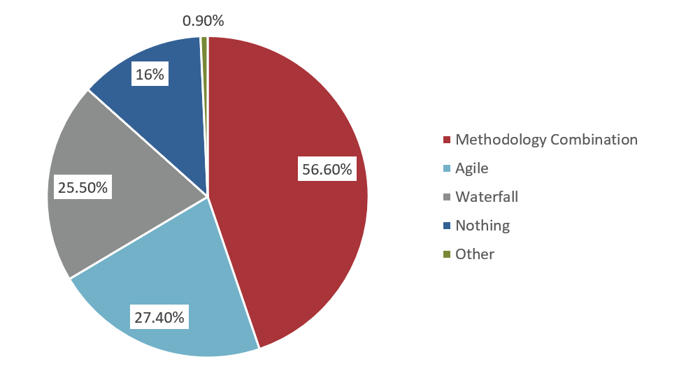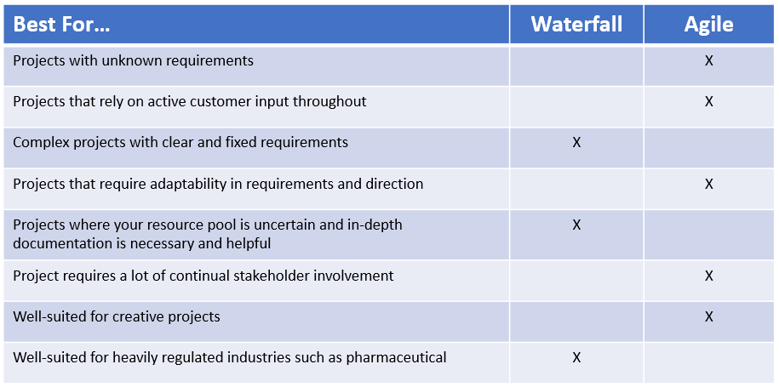February 9, 2024
by Mike Youhouse
February 9, 2024
Managing a project takes a unique set of skills and an approach unlike most business practices. The Project Management Institute (PMI) defines a project as “a temporary endeavor in that it has a defined beginning and end in time, and therefore defined scope and resources. It is unique in that it is not a routine operation, but a specific set of operations designed to accomplish a singular goal. Project Management, then, is the application of knowledge, skills, tools, and techniques to project activities to meet the project requirements.”

Comparison of project methodology use. Data courtesy of LiquidPlanner.
Whether building a bridge, developing software, or optimizing a new process, a skilled project manager uses a system of processes called a framework or methodology to bring about a successful project outcome. There is a small but important distinction between frameworks and methodologies. Frameworks are generally loose and provide structure and guidelines without being too rigid. Methodologies are more prescriptive, providing rules, methods, and deliverables with less room for interpretation. For years, the Waterfall framework was the most popular approach, whereby the team moves linearly from one phase to the next only after the prior phase is complete. This is also called a predictive or phased framework.
More recently, other approaches have been introduced, which are considered “agile” and “lean,” whereby a team iterates and incrementally builds the result. The software industry made this popular because it solved for the pitfalls of the traditional Waterfall framework, where the scope could be unknown and evolve as the project continued.

Examples of situations for project approaches.
Following the introduction of Agile and Lean approaches came a plethora of incremental and iterative frameworks (such as Scrum or XP) and methodologies (such as Kanban) that offer the user many benefits. The breakthrough concept to address the reality that in many circumstances the requirements are not fully understood up front and require customer input is very compelling.
There are circumstances, especially in software development, when a project approach should address this uncertainty and allow for continual evolution of a solution. If a project team can benefit from learning through development and prototyping, then an Agile framework is best.
A great example of where an Agile framework works best is building a new mobile phone. The initial release can offer basic features so that the team can gather feedback with a minimal viable product or even make money on a minimal marketable product. As feedback is gained or as time allows for further development, new features and functionality can be added.
While an Agile or Lean approach solves for some of Waterfall’s shortcomings, there remain many applications when Waterfall is the better choice. For example, when requirements are known up front and a team is not experimenting with new technology, why not take advantage of a Waterfall framework, which forces the project team to lock down scope before proceeding to development?
The reason being is that scope creep and time management are challenges for even the most seasoned professionals. Therefore, for projects like product upgrades where requirements are known early, or large complex system implementations where changing scope too late in the process is often costly and time management is essential, Waterfall is the better choice.
If urgency of delivery is critical and planning is unimportant, then Kanban may be best. Kanban is a lean methodology that is well suited for work in which a big backlog of features is not present and when the focus is on delivering small pieces of work as they come up. There are no sprints nor release plan, but rather work decisions are supply based and minimizing bottlenecks is the focus. For example, fixing production incidents like a broken accounting report or an overused server is a great use for Kanban.
So, if people aren’t forced to wear sweaters on hot days or evening gowns to a sporting event, why force anyone to choose only one methodology when every project is unique? Consider applying a Waterfall framework if you are working with a third-party vendor where milestones are critical indicators of progress and scope cannot be changed without a penalty.
Meanwhile, use an Agile framework, like Scrum, when building new software features where functionality can be bundled and delivered piecemeal for an optimized value proposition, giving the team the opportunity for feedback and iteration. And consider Kanban for your support team when work is unplanned and unknown but needs to be addressed immediately.
The lesson is, select the project approach that best fits the requirements and circumstances of each project or type of work. Don’t get stuck being inflexible when you can be agile.
If you have project management questions, please reach out. Whether it's establishing your project priorities, managing portfolio initiatives, or setting up a PMO, Aspirant’s certified program and project management experts can help. Fill out the form below to start the conversation.